About Us | Why English? | Right to Education
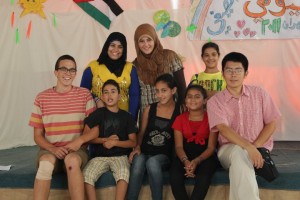 Learning for the Empowerment and Advancement of Palestinians (LEAP) is an educational empowerment program for Palestinian refugee-youth in Lebanon that is dedicated to nurturing the intellectual growth and creative curiosity of our students. LEAP encourages youth to become agents of change by supporting them in their educational pursuits, providing a safe and productive space to explore a myriad of hobbies and interests, and re-inspiring a desire to learn.
Learning for the Empowerment and Advancement of Palestinians (LEAP) is an educational empowerment program for Palestinian refugee-youth in Lebanon that is dedicated to nurturing the intellectual growth and creative curiosity of our students. LEAP encourages youth to become agents of change by supporting them in their educational pursuits, providing a safe and productive space to explore a myriad of hobbies and interests, and re-inspiring a desire to learn.
While our students will graduate into a society that denies them their most basic of rights, education is one of the most valuable tools to help empower them to live self-sufficient and dignified lives. Education is a liberating tool that will help students make informed and sound decisions both inside and outside of the classroom.
LEAP works in two ways: while an educational program for refugee-students, it also works to inform American volunteers about the plight of Palestinian refugees in general, but particularly in Lebanon. Advocacy and awareness is an important component of our program and volunteers return more informed by their firsthand accounts and experiences and share all that they have learned with their home communities.
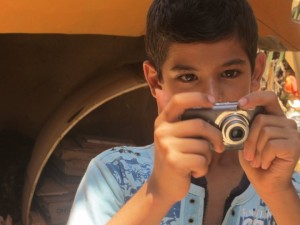 LEAP aims to be the stepping stone between a Palestinian student’s dream and his or her future. Our educational projects are designed with two goals in mind: one, to help students prepare for mandatory entrance high school examinations, such as the national Brevet exam, which is administered in English and secondly, to facilitate student scholarships, college-exchange, and entrance opportunities for refugee-students. Our primary focus is on the national Brevet examination, which is required for entrance to high school and administered in English. Unfortunately, many Palestinian refugee-youth fail the Brevet exam due to low proficiency in English. LEAP is committed to remedying this impediment by helping students to leap forward to high school and beyond, thus improving drop-out rates and increasing opportunities for refugee-youth in Lebanon.
LEAP aims to be the stepping stone between a Palestinian student’s dream and his or her future. Our educational projects are designed with two goals in mind: one, to help students prepare for mandatory entrance high school examinations, such as the national Brevet exam, which is administered in English and secondly, to facilitate student scholarships, college-exchange, and entrance opportunities for refugee-students. Our primary focus is on the national Brevet examination, which is required for entrance to high school and administered in English. Unfortunately, many Palestinian refugee-youth fail the Brevet exam due to low proficiency in English. LEAP is committed to remedying this impediment by helping students to leap forward to high school and beyond, thus improving drop-out rates and increasing opportunities for refugee-youth in Lebanon.
LEAP is a US-based grassroots volunteer-run program that supports Palestinian refugee-youth in Lebanon. LEAP aims to raise awareness about the plight of Palestinian refugees—one of the most central issues of the Israel/Palestine conflict, while simultaneously supporting the educational development of refugee-youth. LEAP is a program of concerned and conscientious individuals who believe strongly in American core values of peace, freedom, and equality for all people, as well as in human rights, international conventions, humanitarian law, and refugee rights.
Although we are fully committed to our program and its mission, our efforts and outcomes are limited. We understand that only drastic legal, civil, and economic reforms on behalf of Palestinian refugees in Lebanon, as well as the implementation of UN resolutions regarding refugees, will significantly and permanently improve the lives of Palestinian refugees in Lebanon. In the meantime, our program aims to re-inspire and motivate students to empower themselves through education and become agents of change, leading them to a future filled with greater possibilities.
Why English?
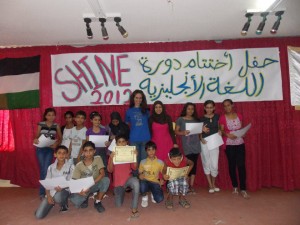 UNRWA studies demonstrate that English is essential to the academic success of refugee-youth in Lebanon. English is the official language in UN schools in which the majority of subjects, material and instruction is conducted in this language. Moreover, the national Brevet exam, which is required for promotion to high school, is administered in English.
UNRWA studies demonstrate that English is essential to the academic success of refugee-youth in Lebanon. English is the official language in UN schools in which the majority of subjects, material and instruction is conducted in this language. Moreover, the national Brevet exam, which is required for promotion to high school, is administered in English.
UNRWA statistics demonstrate that Palestinian refugee-youth perform significantly low on the English section of the Brevet exam in relation to other subject-areas and have low proficiency in the language. Therefore, improving students’ English-language skills will significantly impact their academic performance in other subject areas, as well as increase Brevet passing rates, which will positively impact the pre-highschool drop-out rate due to low passing rates.
Not only will LEAP improve students’ language skills and exam rates, but also change the mundane routine of camp life in the summer by encouraging physical, social, and mental activities to nurture and foster students’ intellectual growth.
Right to Education
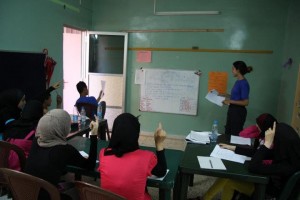 LEAP was founded on the principle that education is a fundamental human right necessary for the exercise of other rights. Access to a quality education paves the way for a productive future, often ends generational cycles of poverty, and alleviates socio-economic inequalities by providing greater opportunities for underrepresented groups of people. It promotes individual freedom and empowerment and yields important development benefits. Yet millions of children and adults remain deprived of educational opportunities, many as a result of poverty. Education is a powerful tool by which economically and socially marginalized adults and children can lift themselves out of poverty and participate fully as citizens. A quality education helps reduce poverty and enables individual and collective empowerment, social cohesion, peace and human development. (Source: UNESCO)
LEAP was founded on the principle that education is a fundamental human right necessary for the exercise of other rights. Access to a quality education paves the way for a productive future, often ends generational cycles of poverty, and alleviates socio-economic inequalities by providing greater opportunities for underrepresented groups of people. It promotes individual freedom and empowerment and yields important development benefits. Yet millions of children and adults remain deprived of educational opportunities, many as a result of poverty. Education is a powerful tool by which economically and socially marginalized adults and children can lift themselves out of poverty and participate fully as citizens. A quality education helps reduce poverty and enables individual and collective empowerment, social cohesion, peace and human development. (Source: UNESCO)
According to the United Nations Millennium Development Goals, the secondary goal is Universal Education whereby:
“Every human being should have the opportunity to make a better life for themselves. Unfortunately, too many children in the world today grow up without this chance, because they are denied their basic right to even attend primary school. A sustainable end to world poverty as we know it, as well as the path to peace and security, require that citizens in every country are empowered to make positive choices and provide for themselves and their families.”
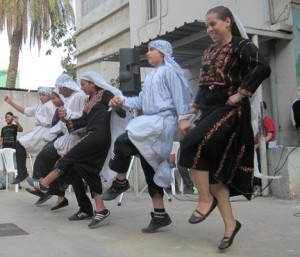 Why is education important?
Why is education important?
- Education beats poverty: one extra year of schooling increases a person’s earnings by up to 10%. 171 million people could be lifted out of poverty if all students in low-income countries left school with basic reading skills.
- Education promotes gender equality by helping women control how many children they have. In Mali, women with secondary education or higher have an average of three children, while those with no education have an average of seven children.
- Education reduces child mortality: a child born to a mother who can read is 50% more likely to survive past age five. In Indonesia, child vaccination rates are 19% when mothers have no education and 68% when mothers have at least secondary school education.
- Education contributes to improved maternal health:women with higher levels of education are most likely to delay and space out pregnancies, and to seek health care and support.
- Education helps combat HIV, malaria and other preventable diseases. In addition, it facilitates access to treatment and fights against stigma and discrimination.
- Education encourages environmental sustainability. It allows people make decisions that meet the needs of the present without compromising those of future generations. The UN Decade of Education for Sustainable Development (DESD), launched in 2005, urges countries to rethink education, curricula and teaching practice in ways that complement the drive to achieve EFA.
- Education helps global development. An estimated $16 billion in aid is needed annually to reach the EFA goals in poor countries. However, in 2008 poor countries received only $2 billion in aid for basic education. The worldwide military expenditure for 2009 was $1.5 trillion.
Additional information can be found in the booklet “Education Counts” http://unesdoc.unesco.org/images/0019/001902/190214e.pdf (originally presented as an exhibition in UN Headquarters, New York, during September-November 2010)
The right to education is enshrined in international law and human rights in the following conventions:
- Article 26 of the Universal Declaration of Human Rights
- Articles 200 and 14 of the International Covenant on Economic, Social and Cultural Rights.
- 1960 UNESCO Convention against Discrimination in Education
- 1981 Convention on the Elimination of All Forms of Discrimination Against Women.









